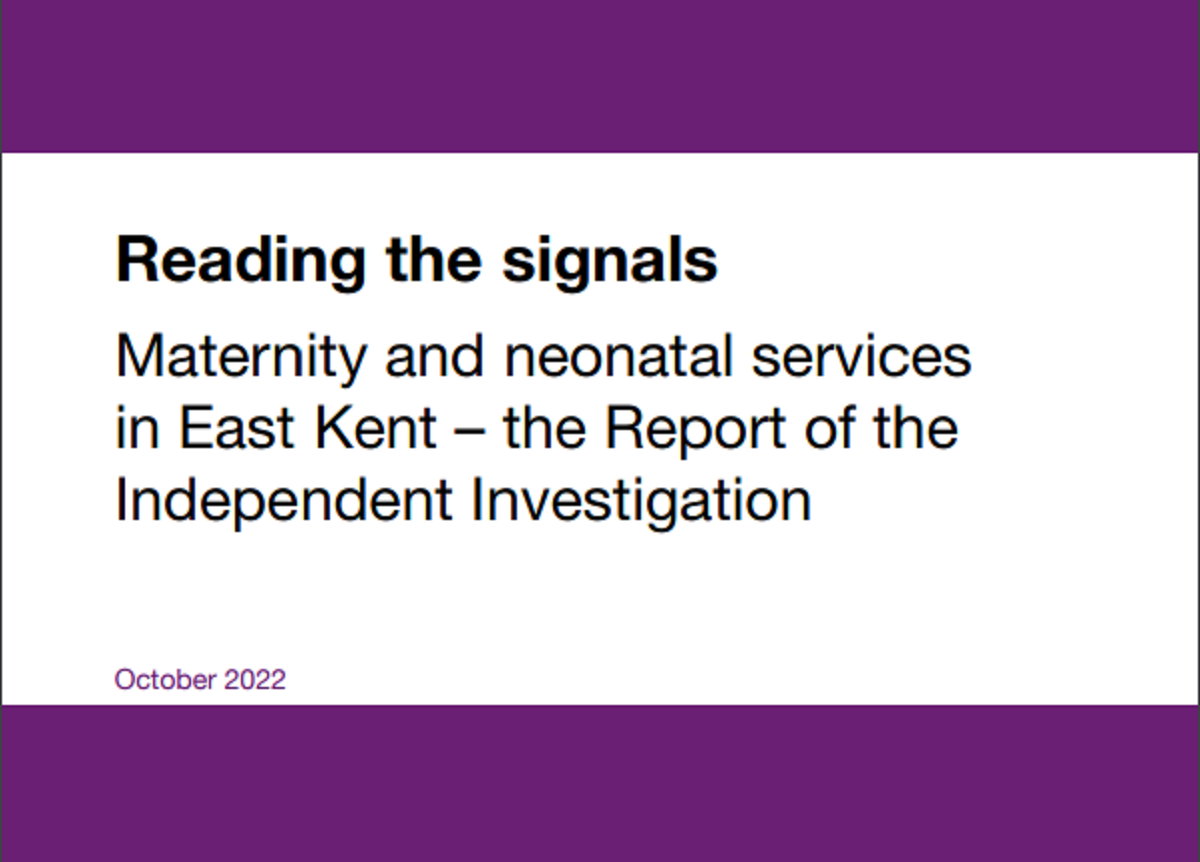Read our full response to the investigation into East Kent maternity services.
‘Respectful care is an essential component of safe care. Caregivers who listen to women [and birthing people], provide them with accurate information and respect their choices make a fundamental contribution to a safe maternity service.’
Birthrights letter to the National Maternity Review, 2015
Seven years on, these words have never rung more true.
On Wednesday 19th October, the long-awaited findings of Dr Bill Kirkup’s independent investigation into maternity services at East Kent were published. The findings are a difficult read, with the scale of devastation laid bare hard to comprehend. First and foremost, our thoughts are with the families who have been impacted by events at East Kent Hospitals University NHS Foundation Trust and commend their bravery in the pursuit of the truth about the maternity care they experienced.
What is particularly difficult to accept is the level of avoidable harm that came to be for dozens of women, babies, and wider families, due to a failure to provide rights-respecting, personalised and compassionate care. What is even harder is that this is the second large-scale report this year – another ‘maternity scandal’ to add to the body of evidence and growing list of recommendations and plans that aim to prevent events of this scale occurring.
The East Kent report and rights-respecting care
What is evident in the findings of this report – and the others that came before – is the essential role that human rights play within maternity care. How important it is that the impact of not upholding human rights at the centre of maternity care is recognised. While human rights give women and birthing people the right to receive maternity care, it also gives them the freedom to make their own choices about their maternity care. It also dictates that the care that healthcare professionals provide must respect dignity and freedom in that choice.
In the East Kent investigations (and those that came before) many of the examples of poor care are breaches of human rights at the most basic level. Article 3 of the Human Rights Act prohibits inhuman or degrading treatment. Article 8 (the right to private and family life) protects the right to physical integrity and to make choices about what happens to one’s own body. Article 14 protects people against being treated in a discriminatory manner. All of these are covered – in more than one example.
Recognising the role in human rights in maternity care could have prevented many of the negative experiences described in the report, including:

It is clear that the healthcare professional in this case did not understand the human rights principles that should underpin their care and approach. The failure to respond and provide adequate pain relief can cause intense physical and mental suffering that can amount to a breach of Article 3.

The right to private and family life requires that a person can make informed decisions about the circumstances of their births. Where women and birthing people are coerced or pressured into making a certain decision, this may breach their rights under Article 8.

Article 14 entitles people to enjoy the other rights of the convention without discrimination and equal treatment in their maternity care. This means that a person could not be judged or treated poorly on the basis of a characteristic like age, race, ethnicity or sexuality.
What is also clear in this report is the experience of staff. It is shocking to read of the breakdown in team working across maternity and neonatal care at the Trust. We know good quality and safe patient care is provided when colleagues across the multi-disciplinary team work openly, honestly, supportively and with a no-blame culture. Much of the examples echoed the findings of the Ockenden Review and those that came before it.
What needs to change?
It is too late to pretend that this is just another one-off, isolated failure, a freak event that “will never happen again”. Since the report of the Morecambe Bay Investigation in 2015, maternity services have been the subject of more significant policy initiatives than any other service. Yet, since then, there have been major service failures in Shrewsbury and Telford, in East Kent, and (it seems) in Nottingham. If we do not begin to tackle this differently, there will be more.
Dr Bill Kirkup
This report was different from many others as it did not detail changes of policy directed at specific areas of either practice or management. Kirkup made clear his views on this approach: it does not work. There are challenges within maternity services, including shortages of staffing across the entire maternity workforce, that means that key recommendations of other reports are slow to be implemented or targets are dropped altogether (in particular, the target to implement Continuity of Carer, a mode of care evidenced to improve experiences and outcomes of pregnancy, particularly for Black, Brown and mixed ethnicity women and birthing people).
The need for proper funding and real commitment to improving staff recruitment and retention cannot be overstated. In response to the East Kent report, Dr Caroline Johnson MP said that the Government would be ‘urgently reviewing the recommendations in detail’ and will be ‘issue a full response’ in due course. Our message, alongside others in the sector, is that now is not the time to deprioritise maternity services. Birthrights, alongside the maternity sector, is calling for meaningful intervention from the Government, including uplifting investment in maternity services to the £250-300m level recommended by the Health & Social Care Committee in 2021.
However, the issues that maternity care are facing go beyond improving the workforce and wider resources. There also needs to be a culture shift that embeds human rights at the centre of care. The foundation of maternity services currently relies on principles that fail to recognise women and birthing people as the primary decision maker in their care. It prioritises perceived efficiency over compassion and falls back on power hierarchies both within healthcare professional roles and also in the relationship between patient and healthcare professional – all laid out in great detail in the East Kent report. Understanding the role of human rights in practice should not be an additional learning objective but should be central to education and the delivery of maternity care from the very beginning. We hear healthcare professionals from across multidisciplinary teams of the impact our training has had. Bringing human rights to fore makes a significant difference to the care they provide and – most importantly – made a difference to birth experiences and outcomes for women and birthing people.
Need advice about your maternity care?
Knowing your rights and the law in pregnancy and childbirth is important. If you have are pregnant or recently given birth and need advice on any aspect of your care, please contact our advice team.
Our free factsheets provide you with the latest information on your rights, where they come from in law, and how they are backed up in guidance.
Birthrights is the UK charity that champions respectful maternity care by protecting human rights. We provide advice and legal information to women and birthing people, train healthcare professionals to deliver rights-respecting care and campaign to change maternity policy and systems.
Do you work with pregnant women and birthing people?
Our training equips doctors, midwives and other birth workers with knowledge of the law and human rights principles, an understanding of how to apply it in practice, and the ability to communicate effectively with women and birthing people in a way that upholds their human rights. We offer a 10% discount to multidisciplinary teams.
Need advice about your maternity care?
Knowing your rights and the law in pregnancy and childbirth is important. If you have are pregnant or recently given birth and need advice on any aspect of your care, please contact our advice team.
Our free factsheets provide you with the latest information on your rights, where they come from in law, and how they are backed up in guidance.
Birthrights is the UK charity that champions respectful maternity care by protecting human rights. We provide advice and legal information to women and birthing people, train healthcare professionals to deliver rights-respecting care and campaign to change maternity policy and systems.
Birthrights is the UK charity that champions respectful maternity care by protecting human rights. We provide advice and legal information to women and birthing people, train healthcare professionals to deliver rights-respecting care and campaign to change maternity policy and systems.

